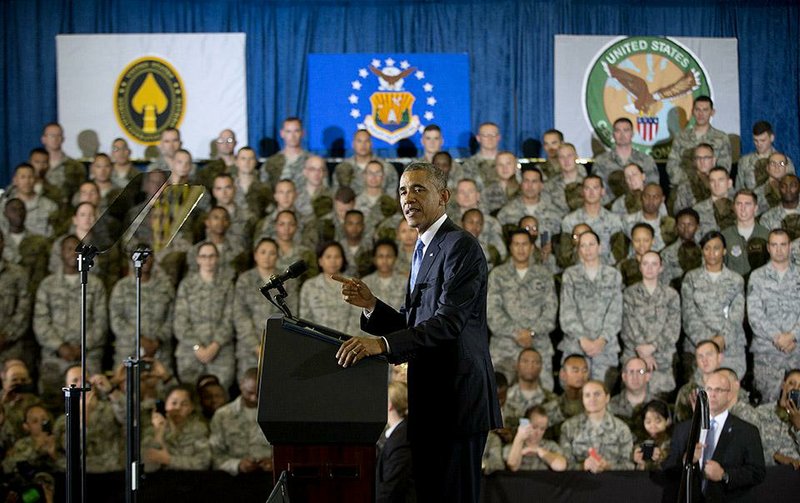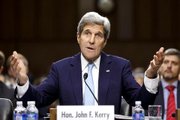WASHINGTON -- The Republican-controlled House voted to give the administration authority to train and arm Syrian rebels on Wednesday as President Barack Obama emphasized anew that American forces "do not and will not have a combat mission" in the struggle against Islamic State militants in either Iraq or Syria.
RELATED ARTICLES
http://www.arkansas…">State's delegation in D.C. backs planhttp://www.arkansas…">15 arrests head off terror attack, Australians say
The 273-156 vote crossed party lines, with top Republican and Democratic leaders backing Obama's plan, while dozens of rank-and-file lawmakers in both parties opposed it.
The provision was added to spending legislation that will ensure the federal government operates normally after the Sept. 30 end of the budget year. The spending bill later passed on a vote of 319-108, and final approval is expected in the Senate as early as today.
However, even supporters of the military plan found little to trumpet.
"This is the best of a long list of bad options," said Rep. Jim Moran, D-Va.
One Republican supporter noted that the measure includes strict limits on Obama's authority.
"Members on both sides of the aisle are very concerned that too much of Congress' war-making power has gone to the president," said Rep. Tom Cole of Oklahoma.
Obama spoke Wednesday after meeting at U.S. Central Command in Florida with Gen. Lloyd Austin, Defense Secretary Chuck Hagel and representatives of more than 40 countries that are part of the coalition the U.S. is building to counter the extremists.
Obama reiterated his decision to take limited military action, saying the U.S. will use airstrikes to "support Iraqi forces on the ground as they fight for their own country against these terrorists."
He told officers at Central Command, which oversees American military efforts in the Middle East, that, "as your commander in chief, I will not commit you and the rest of our armed forces to fighting another ground war in Iraq."
His remarks came alongside similar comments by House Democratic Leader Nancy Pelosi of California, designed to reassure liberal lawmakers that the new military mission would be limited.
Pelosi said the House action "is not to be confused with any authorization to go further. ... I will not vote for combat troops to engage in war."
In a statement after the vote, Obama said the House "took an important step forward as our nation unites to confront the threat posed" by the Islamic State extremist group, showing bipartisan support for a "critical component" of his strategy against the extremists.
Only a day earlier, Gen. Martin Dempsey, chairman of the Joint Chiefs of Staff, drew widespread attention when he told Congress he might recommend the use of U.S. ground combat forces if Obama's current strategy fails to stop the militants.
Obama didn't directly address Dempsey's remarks Wednesday, but he said that while the U.S. has a responsibility to lead the fight, it can't do "what Iraqis must do for themselves."
The U.S. will be more effective providing intelligence, logistics and air power than it would be sending in troops, he said, adding that a U.S. troop commitment won't help the cause of long-term stability and self-sufficiency in the region.
Across the political aisle from the president and Pelosi, Speaker John Boehner, R-Ohio, and House Majority Leader Kevin McCarthy of California swung behind the plan. Yet many other Republicans expressed concerns that it would be insufficient to defeat the militants, who have overrun parts of Syria and Iraq.
In all, 85 Democrats and 71 Republicans voted to deny Obama the authority he sought. The measure passed on the strength of 159 votes from Republicans and 114 from Democrats.
GOP lawmakers took solace in the short-term nature of the legislation. It grants Obama authority only until Dec. 11, giving Congress plenty of time to return to the issue in a post-election session set to begin in mid-November.
Officials put a $500 million price tag on Obama's request to train and equip rebels. The cost generated virtually no discussion among lawmakers, who focused instead on the possible consequences of a new military mission after the years-long wars in Afghanistan and Iraq.
Testifying before a Senate Committee, Secretary of State John Kerry said the forces seeking to create an Islamic state "must be defeated. Period. End of story."
There was little, if any dissent on that, but debate aplenty about the best way to accomplish it.
"We simply don't know if somewhere down the line it will turn our guns back against us," said Rep. Loretta Sanchez, D-Calif., giving voice to a fear that rebels seeking the removal of Syrian President Bashar Assad would eventually prove unreliable allies.
Republican Rep. Tom McClintock of California expressed a different concern. "Committing insufficient force in any conflict is self-defeating, and airstrikes alone cannot win a war," he said.
Meanwhile, Sen. Marco Rubio of Florida, one of several Republicans considering a run for president in 2016, called Wednesday for increased U.S. defense spending and greater intervention abroad.
"The world needs American strength just as much as our people and our economy do," Rubio said at a conservative gathering in Washington. "No other nation can deter global conflict by its presence alone."
No U.S. troops, Iraqi says
In Baghdad on Wednesday, Iraq's new prime minister said his government does not want a U.S. combat mission.
Prime Minister Haider al-Abadi praised the U.S. aerial campaign targeting the militants who have overrun much of northern and western Iraq and carved out a proto-state spanning the Syria-Iraq border, saying the airstrikes have helped efforts to roll back the Sunni extremists.
But he stressed that he sees no need for the U.S. or other nations to send ground troops into Iraq.
"Not only is it not necessary, we don't want them. We won't allow them. Full stop," he said.
Instead, al-Abadi urged the international community to expand its campaign against the extremists in neighboring Syria, noting that militants coming under pressure in Iraq are retreating back into Syria.
The Iraqi premier said that as airstrikes in Iraq continue, the Iraqi military will choose and approve targets, and that the U.S. will not take action without consulting with Baghdad first.
Failure to do so, he warned, risks causing widespread civilian casualties as has happened in Pakistan and Yemen, where the U.S. has conducted drone strikes for years.
"We are not giving any blank check to the international coalition to hit any target in Iraq," al-Abadi said.
But while al-Abadi's insisted Iraq take the lead in the fight against the extremists, Dempsey said Wednesday that about half of Iraq's army is incapable of partnering effectively with the U.S. to roll back the Islamic State's territorial gains, and the other half needs to be partially rebuilt with U.S. training and additional equipment.
The bolstering of Iraqi security forces was one element in a multifaceted campaign plan that Obama was briefed on Wednesday in Florida. Once Obama signs off on the plan, the Iraq portion will need to be adapted, in consultation with the Iraqi government, to fit the Iraqis' priorities, Dempsey said.
The Islamic State group was established in Iraq but spread in early 2013 to Syria, where it grew exponentially in the chaos of that country's civil war. After its success in Syria, the extremist group's fighters moved back into northern and western Iraq in June, seizing a huge swath of land.
The group now controls territory stretching from northern Syria to the outskirts of Baghdad, where it has established an Islamic state, or caliphate, ruled by its harsh interpretation of Islamic law.
The U.S. has rejected cooperating with the Syrian president in its expanded campaign against the Islamic State. The White House has long called Assad's rule illegitimate and demanded he step aside.
Al-Abadi, however, said Iraq doesn't have the luxury of refusing cooperation with Damascus, and instead pushed for some sort of coordination.
"We cannot afford to fight our neighbor, even if we disagree on many things," al-Abadi said of the Assad regime.
The two countries, both of which are allies of Iran, appear to already be coordinating on some level. Iraq's national security adviser met Tuesday with Assad in the Syrian capital, where the two agreed to strengthen cooperation in fighting "terrorism," according to Syria's state news agency.
The U.S. also has ruled out working with Iran to oppose the extremists, prompting al-Abadi to question the coalition's vision.
"I actually find it puzzling that we hold a conference in Paris to help Iraq and to fight terrorism and ... the biggest neighbor of Iraq -- Iran -- is excluded," he said. "That puts me as prime minister in a very difficult position."
Al-Abadi added that Iraq is caught in the middle of "a disagreement between the international allies -- this international coalition -- and Iran. ... For me, that is catastrophic."
Elsewhere on Wednesday, Saudi Arabia's highest body of religious scholars issued a ruling calling terrorism a "heinous crime" and saying perpetrators including Islamic State militants deserve punishment in line with Islamic law.
The Council of Senior Religious Scholars said in its fatwa, or religious edict, that it backs the kingdom's efforts to help track down and punish followers of the Islamic State and al-Qaida.
The statement by the group of 21 scholars gives religious backing to the Saudi king's efforts to fight the Islamic State as part of the international coalition. It also underpins the kingdom's broader efforts to deter citizens from joining extremist groups, which pose a threat to the Western-allied monarchy.
Information for this article was contributed by David Espo, Donna Cassata, Jim Kuhnhenn, Robert Burns, Vivian Salama, Qassim Abdul-Zahra, Andrew Taylor, Alan Fram, Erica Werner, Michael J. Mishak, Abdullah al-Shihri, Aya Batrawy and staff members of The Associated Press; by Michael D. Shear of The New York Times; and by Angela Greiling Keane, Roger Runningen, Heidi Przybyla, James Rowley, Tony Capaccio, Del Quentin Wilber and Phil Mattingly of Bloomberg News.
A Section on 09/18/2014


